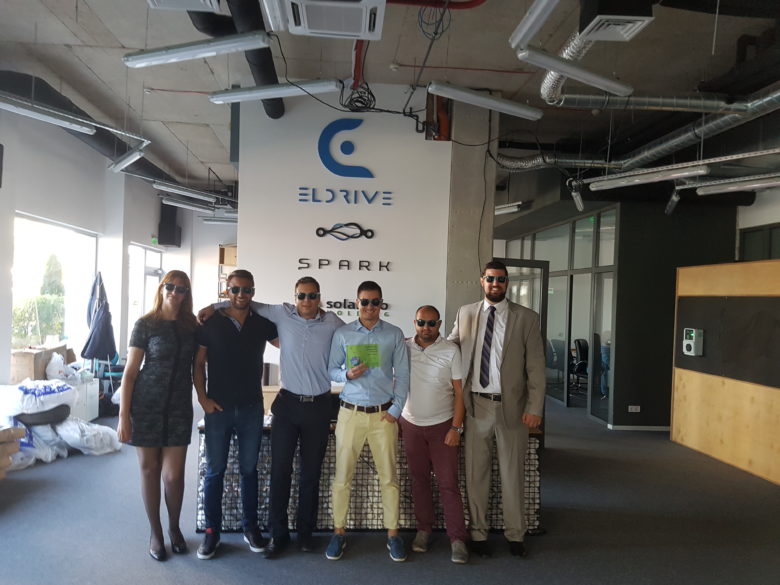Bulgarian-Lithuanian E-Carsharing Company Spark Will Enter Two New Markets in 2019

It seems an irrational decision to launch a car sharing service with electric cars only in the country with the oldest diesel fleet in EU. The model though seems to be a successful one. The first car sharing company in Bulgaria is an evidence for that. Spark launched exactly a year ago as a joint venture between the Bulgarian charging infrastructure provider Eldrive and the Lithuanian e-carsharing company Rideshare. In the past twelve months, Spark has grown its fleet to over 100 e-vehicles in Sofia, has attracted over €1M of investments and is now planning to expand to Romania.
“Spark initiated operations in November 2017 with a fleet of 25 vehicles and zone coverage in Sofia much smaller than of the one we have today. We hoped that our service will be welcomed, but what happened in reality exceeded expectations – we had more than 2K registrations in the first two days. That literally crashed the system”, Stefan Spasov, CEO of Spark, laughingly recalled. Today the company, which offers its service only in the Sofia and Vilnius, has 20K users only in the Bulgarian capital.
What is first: the charger or the e-car
Spark is indeed part of the group eMobility International, which also owns Eldrive. Years before Spark started, Eldrive was investing in building an infrastructure of charging stations in Bulgaria. “EV mobility and the car sharing business grows exponentially on a global scale. We believe that is the future and want to be one of the first players on the regional market. Of course, such initiative is a long term investment of innovative nature, and creating a solid business case takes time and patience”, explained Spasov. The company’s financial reports show €320K revenues and €200K loss in 2017. According to Spasov there are 600 e-cars in Bulgaria, but most of them (80-90%), following the global trends, are charged at home.
Eldrive’s team, however, has decided to lead the process of building and utilizing such infrastructure and has installed over 120 charging stations in Bulgaria, around 60 of which are in Sofia. The company also has a solution that allows potential clients to monitor or reserve charging stations via mobile app. “If we want people to adopt e-mobility, we need to give them the security and comfort of using such services. Moreover, this is directly related to the infrastructure. It’s so important to be able to monitor where are the charging stations, whether they are free, what are the conditions, so you can plan your trip”, said Spasov.
The next logical step for eMobility was to start exploring the e-cars market. The first attempt in this direction was the B2B leasing of e-cars, a business line still developed by the company. However, the breakthrough came through Spark and the B2C platform and service.
The typical user
Bulgaria is often referred to as the B2B ecosystem, as it is widespread that C or the customers and early adopters are hard to find here. That was not the case with Spark. The the younger audience quickly recognized the service by. “The typical user is between 25-40 years old and has a modern urban culture lifestyle. Many of the thousands of clients we have are professionally involved in the IT sector, and that is not surprising – these are the early adopters of a service such as Spark”, Spasov explained. One of the surprises for the team was the share of female users in Sofia – almost 50%, something that is not typical for the car sharing sector. “I think that at this point we can say that Spark has become an important part of the city transportation mix in Sofia”, Spasov told Trending Topics.
According to him a lot of the clients use the service as an alternative to owning a personal vehicle. A user typically spends around 20 minutes or between 8 and 12 kilometers driving Spark. Similar to other well-known car sharing services Spark also charges per minute, but there are also day and weekend packages.
The Eastern E-mobility conquer
In 2019, the company will grow its fleet in the Bulgarian capital city to 400 vehicles. After showing some traction in Sofia and Vilnius, Spark is now seeking expansion. “We’ll launch the service in at least two other cities in the region in 2019, starting with the Romanian capital Bucharest early next year”, Spasov told Trending Topics. The strategy of the company is to cover large cities with population of at least 1.5 million people. Expanding to smaller cities in the countries is not in the plan, at least not in the next three to four years.
Even though Spasov’s first milestones are within the Southeastern European and Baltic market, Western Europe is also part of the roadmap. Being a mass and low-cost service is the competitive advantage of the company. “Our competitive advantage is the aggressive approach we undertake in setting the price levels. We develop everything in-house and that allows us to optimize and operate with low margins. We are targeting the mass market and I would say our prices are around 50% lower than many of the leading companies in this sector in EU”, Spasov explained.
The price per minute is €0.15 in Bulgaria and €0.17 in Lithuania. The price indeed seems to be significantly lower as established providers of the service in Europe such as Car2go and DriveNow offer prices from €0.25. Spasov claims Spark would keep the low prices of the service also on Western European markets. “There is room for everyone on the market, or at least for a few players with large fleets in a single city. And as demand grows with supply, I am confident that the market will keep growing”, Spasov said.
Even though the first relevant financial reports of the company are not public yet, according to the management the company is growing every month. Spark’s investors also seem optimistic. “I think the company has the potential to be a leading regional player and even to be acquired by either a transportation company or a vehicle manufacturer”, forecasted Pavel Ezekiev, managing partner at NEVEQ, the investment fund that holds around one third of eMobility.




























